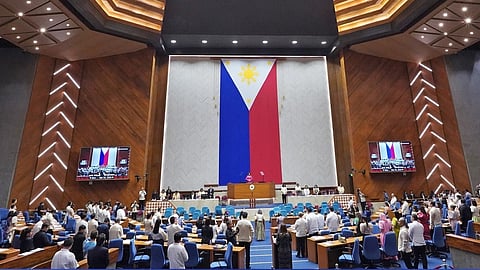
- NEWS
- the EDIT
- COMMENTARY
- BUSINESS
- LIFE
- SHOW
- ACTION
- GLOBAL GOALS
- SNAPS
- DYARYO TIRADA
- MORE

The House of Representatives has posted a dismal job approval rating of only 45 percent, with 43 percent of respondents expressing dissatisfaction and 12 percent undecided or non-responsive, according to a nationwide survey conducted by the HKPH Public Opinion and Research Center in partnership with the Hong Kong-based Asia Research Center (ARC).
Even more concerning, House Speaker Martin Romualdez received an even lower approval score of 39 percent, while 46 percent expressed dissatisfaction and 15 percent were undecided or refused to answer.
“These numbers reflect a growing national dissatisfaction with both the institution and its leadership,” said Steven Su, program director of the survey conducted from 1 to 6 June 2025, with 3,500 respondents nationwide. He noted that political missteps during the recently concluded midterm elections played a major role in souring public sentiment.
“The impeachment case filed during the campaign period struck a deep chord with the electorate,” Su explained. “Instead of promoting accountability, the timing backfired. It gave the impression that politics took precedence over governance. Many saw it as a self-inflicted wound by the House and its leadership.”
The public largely viewed the impeachment push as an opportunistic maneuver launched at a politically volatile time, the survey found. The backlash not only weakened the administration's Senate slate — fueling a surge in support for opposition candidates — but also damaged congressional campaigns aligned with the Speaker, particularly among lawmakers who had signed the impeachment complaint.
Several congressional candidates — both winners and losers — told Su in post-election interviews that the impeachment controversy became a political burden they had no choice but to carry.
“It became a campaign not about platform or progress, but about blame and backlash,” some legislators remarked, describing the campaign period as the most divisive and brutal they had ever faced. There were stories of betrayal, coercion, and deep internal fractures within party lines.
While Congress absorbed the brunt of public frustration, the executive branch emerged relatively unscathed, buoyed by President Ferdinand Marcos Jr.'s popular P20-per-kilogram rice initiative, which received 90 percent public support.
The study concluded that while the President's pro-poor measures were lauded, Congress was seen as falling short in helping advance such initiatives.
Su said the President’s earlier statement that the midterm elections were a “wake-up call” was not just political rhetoric — it reflected the national mood.
“Filipinos are growing weary of political grandstanding. They are demanding substance over spectacle,” Su said. “If Congress continues on its current path, it risks further alienating the public. President Marcos still has three years to shape his legacy, but unless the House shifts from politicking to public service, that legacy may be marred by legislative inaction and voter discontent.”
The survey was conducted through face-to-face interviews and carries a ±2 percent margin of error at a 95 percent confidence level.
